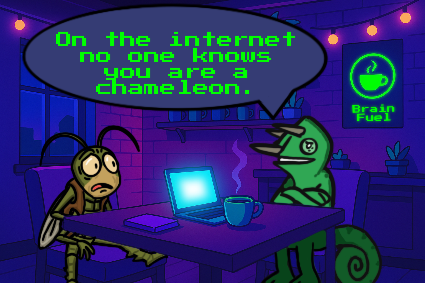Humans crave connection. Am I right? I mean, that’s pretty much what they were created for, and when that slithering serpent (a.k.a. disgraced reptile) got them kicked out of the garden, they’ve been looking for a place to belong ever since. Fast forward thousands of years and BOOM, the internet promises to connect you with more “friends” than a lizard has skins in a lifetime. It’s no wonder then that one of their greatest needs is also their greatest weakness.
I cringe to admit it, but scammers have evolved into full-blown digital chameleons. Whether it’s a fake crypto guru or a profile using stolen selfies to reel in the lonely-hearted, they exploit the very platforms designed for connection. Once havens for photo dumps and baby updates, these platforms are now ripe for the snatching — like grub in a jar.

In 2024, the Federal Trade Commission (FTC) data showed that the number one method of contact for fraudsters was social media — for victims under 70 that is. Pause and let that sink in a bit for a moment. This report rides on the heels of news that investment scams led all other fraud loss categories by over $4.6 billion in 2023. And while the FTC has made good on its promise to crack down on impersonators—like the case against Panda Benefit Services, who faked ties to the Department of Education—you can’t hold back the ocean with a broom.
It’s the same story with law enforcement. Even if they are lucky enough to have jurisdiction to pursue a scam case, chances are they are already bogged down in a million others. Enjoy watching your IC3 tips sink into oblivion.
Just as in real life, scammers spread online like a contagion. Using fabricated accounts, these punks worm their way into social circles to build legitimacy. What’s even better? Hijacked accounts, where the trust is already baked in. They literally weaponize human relationships — flipping connection into currency. So ya, if you get an elf video from your Great Aunt Ruth who thinks TikTok is a breath mint, probably not her sending you the video…
We may laugh about the “Great Aunt Ruth”s in our lives, but maybe that’s the scary part? Most people still don’t take these scams seriously. We treat them like minor annoyances — spam in the inbox, another weird DM, a sketchy pop-up we know better than to click. But behind those screens are people being blackmailed, manipulated, and wiped out financially. Some are losing not just their money, but their dignity, their reputations — even their will to live. Meanwhile, corporations beam into our homes and pockets, tracking clicks, habits, and emotions, often doing more to monetize vulnerability than to protect it. So if people won’t (or can’t) protect themselves, who should? Who can?
The Internet Corporation for Assigned Names and Numbers (ICANN’s) takes a nuanced approach to online scams. While enforcing policies and contracts that prohibit fraudulent behavior related to domain name registration and usage, they wipe their hands clean of any responsibility for website content. Funny enough, they actually suggest you should approach the website owner for dispute resolution. Can you imagine?
Dear Mr. and Mrs. Scammer,
I am reaching out to you in accordance with ICANN's recommendations. Do you mind not scamming people on your website anymore?
Sincerely,
😭 Sad Face ChameleonGood luck with that! I can’t say I blame ICANN though since attempting to do so would quickly become a political quagmire. From their perspective, businesses have no issues seeking a competitive advantage by bringing false accusations against their competitors.
Section 230 of the Communications Decency Act shields social media companies from liability. While each platform takes a similar to ICANN hands-off approach more-or-less, the “Good Samaritan” clause under Section 230(c)(2) gives them the legal flexibility to decide just how deep they want to wade into the muck. This opens them up to accusations of manipulation, censorship, and bias — often all at once. The ugly truth? Content moderation is a net cost. Brand reputation only matters up to a point, and once the cost of cleaning house outweighs the benefit of a cleaner, platforms quietly throw in the towel. That threshold sits embarrassingly low for most.
For the majority of corporate environments, the cost of playing whack-a-mole with the latest scam outweighs any potential benefit. One would hope that the stars of altruism and capitalistic greed might align into a virtuous budget for anti-fraud; however, if the company has a fraud team at all, they bake in an acceptable percentage of loss. They’ve done the math.
Sound pretty bleak? Fight fraud anyways.
Because the same thing that makes humans vulnerable — a craving for connection — is also what makes them powerful. Real connection, the kind built on awareness, empathy, and a little healthy skepticism, is still your best weapon. You don’t need to become a digital hermit, but you do need to stop assuming every DM is sent in good faith. Ask questions, double-check your assumptions, and someone please get Great Aunt Ruth back her TikTok account.
Every little thing you do to make a fraudster’s day harder is a win, and, collectively, we can still make a difference. Value is not always determined by the bottom line. In a world where trust is currency, maybe the best way to fight back… is to invest it wisely.

